Creating a visually appealing and functional landing page and website is crucial for businesses and individuals looking to establish an online presence. Canva has emerged as a powerhouse in the design world, providing users with a versatile platform to create stunning visuals for various purposes.
While many recognize Canva for crafting eye-catching event flyers or social media graphics, not everyone knows how to create a website in Canva or that it can be used to design fully functional websites and landing pages.
In this guide on how to create a website on Canva, we'll explore leveraging this versatile and user-friendly design tool to build a compelling landing page. Whether you're a CEO, digital marketing analyst, or junior designer, you'll find valuable insights and practical tips to elevate your landing page and website.
Why Choose Canva for Website Building?
In a landscape filled with website builders like Wix and WordPress, Canva offers a design-centric approach to website creation. It grants users complete control over the visual aspects of their websites, allowing them to turn any Canva design, no matter how intricate, into a fully operational website.
With Canva, you're not limited to traditional design elements. Whether it's videos, icons, images, or text designs, Canva lets you seamlessly integrate these components into a visually striking website. Moreover, you can create captivating mockups of your website directly within the Canva editor.
Important Note: This article provides a concise overview of Canva's features. If you're interested in learning how to create a website on Canva with a step-by-step guide, check out the embedded video below. The video showcases the versatility of Canva along with practical tips to enhance your website creation process.
How to Create a Website on Canva: A Step-by-Step Guide
Embark on your journey to a captivating website with Canva by following these simple steps.
Step 1: Setting Up Your Canva Account
Begin by signing up for a free account on Canva. The beauty of Canva lies in its straightforward and versatile features, making it an ideal choice for those new to web design or seeking a quick, visually appealing page. While Canva may not replace dedicated website builders, it offers a cost-effective solution for those starting out.
Step 2: Exploring Canva Templates
After signing in, navigate to the "Projects" section and click on "Create Design." Type "website" in the search bar and select a template that suits your needs. Canva provides various templates for different types of websites. Choose a template that aligns with your vision and click to open it in a new tab.
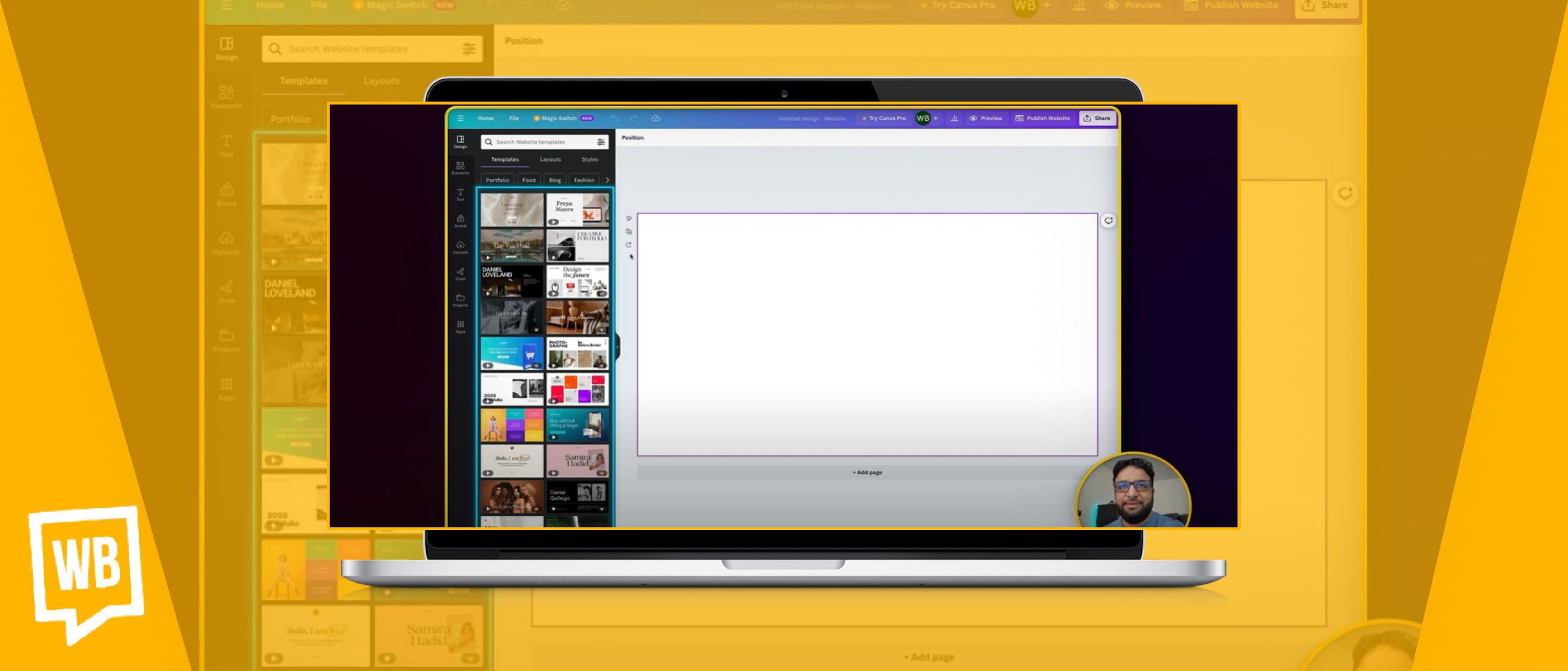
Step 3: Customizing Your Website
Canva's templates offer many sections and elements. Explore the available options and customize each section to fit your content. You can easily modify text, images, and colors to match your brand or personal style. Canva's drag-and-drop interface allows you to add and rearrange elements effortlessly.
- Once you choose a template, its components load into the Canva editor.
- For multi-page templates, click "Apply all X pages" on the left sidebar to load all pages.
- Add or exclude specific pages by clicking the "+ Add page" button and selecting pages on the left sidebar.
- Resize pages by dragging the nodes on the edges to your preferred size. Customize each section, edit text, and adjust visuals until you are satisfied with the overall structure.
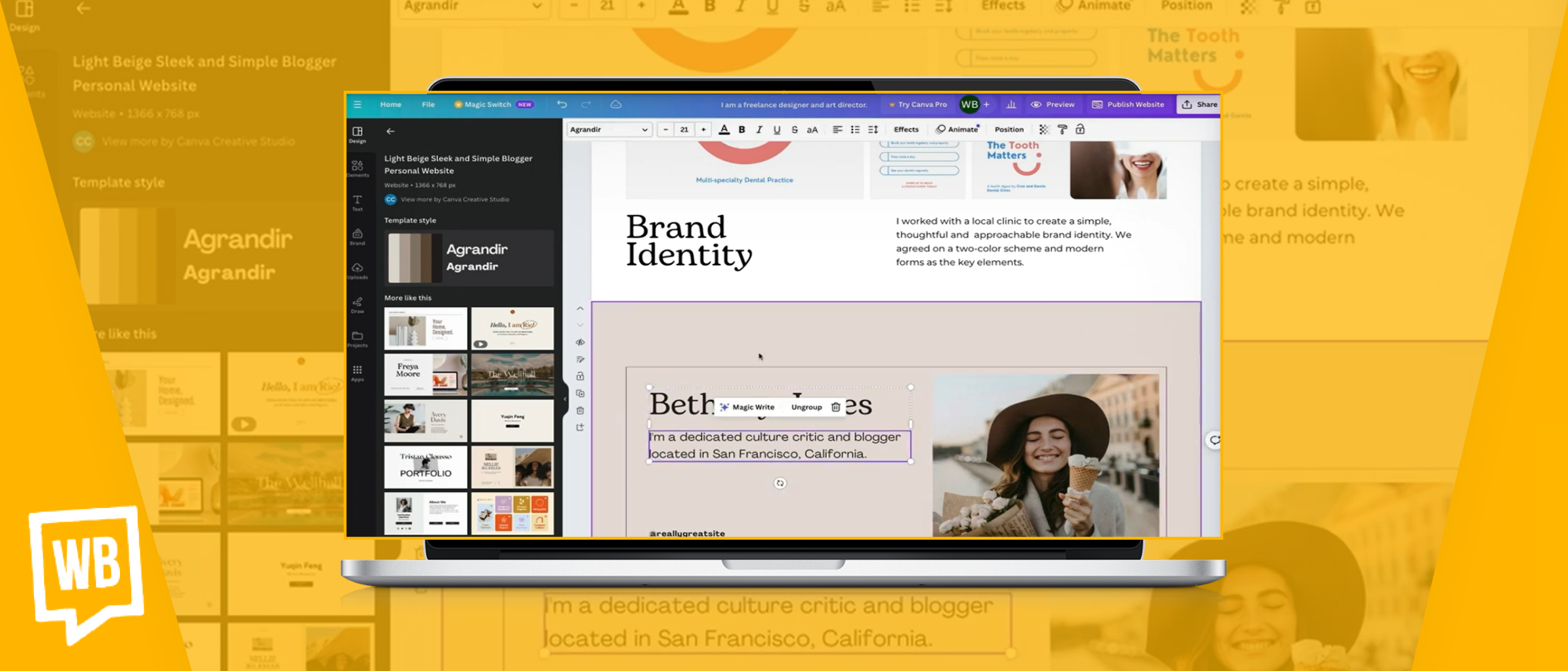
Step 4: Add and Edit New Components
Canva allows you to incorporate various components into your website, from text and images to videos.
- Edit text components by clicking, typing new text, and resizing as needed.
- Replace or upload images by clicking on them, deleting them, and choosing new ones from uploads or Canva's gallery.
- Add icons or videos using the Elements tab on the left sidebar.
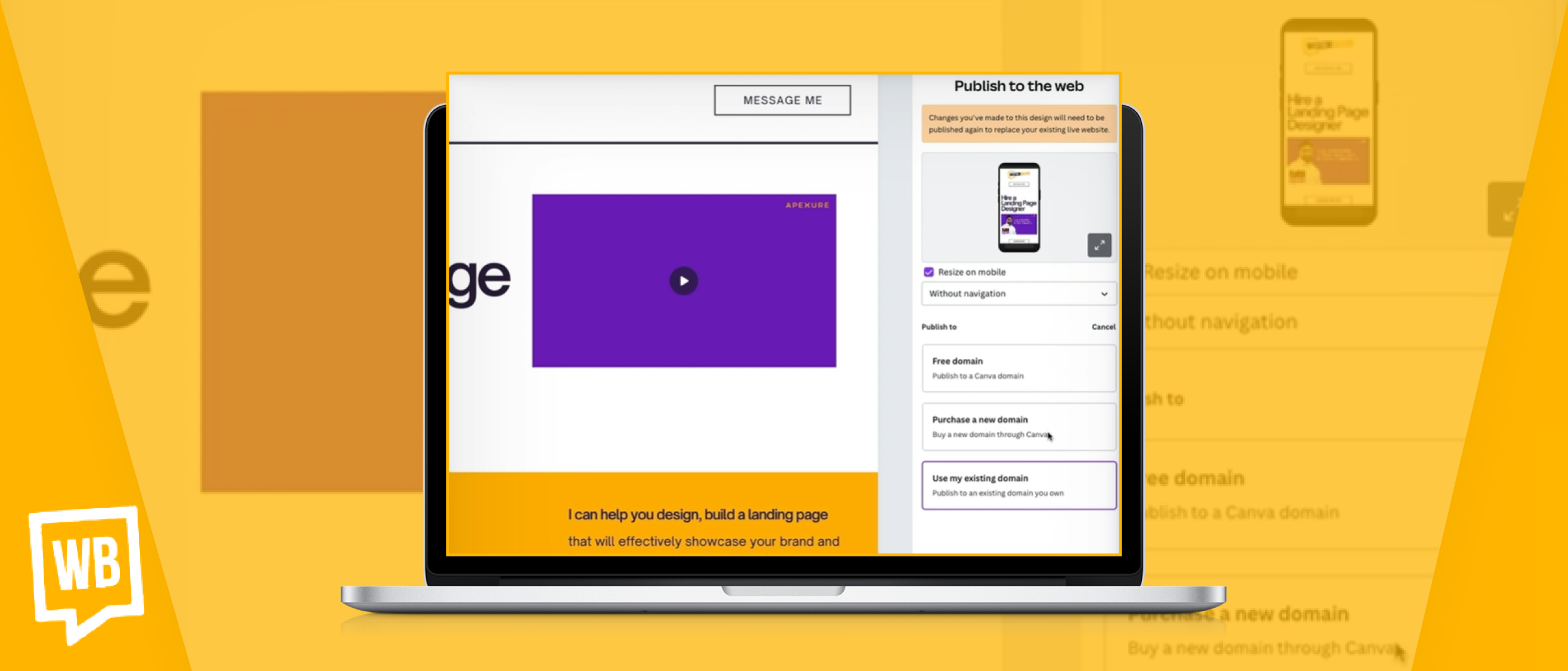
Step 5: Add Links and External Resources
Canva simplifies the process of embedding videos. Drag and drop your video, resize it, and position it accordingly. Whether it's an uploaded video or a YouTube link, Canva seamlessly integrates it into your page.
- To add a link, right-click on a component, select "Link," and enter the URL.
- Embed external content like YouTube videos using the Canva Magic menu.
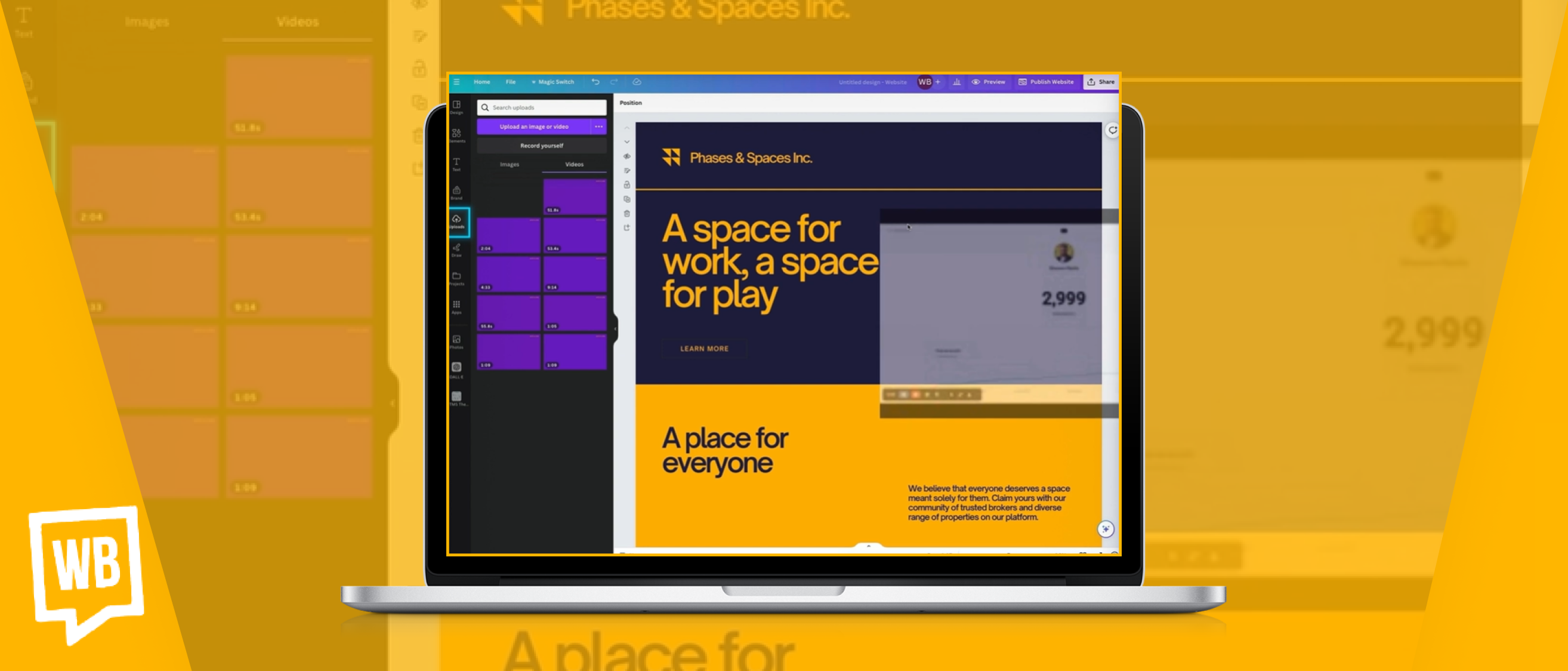
Step 6: The Finishing Touches
After incorporating all necessary components, refine your website with some finishing touches.
- Right-click on added images to "Apply colors to page" for seamless blending.
- Preview your website using the "Preview" button to ensure it looks as intended.
- Check mobile compatibility by clicking the smartphone icon in the preview screen.
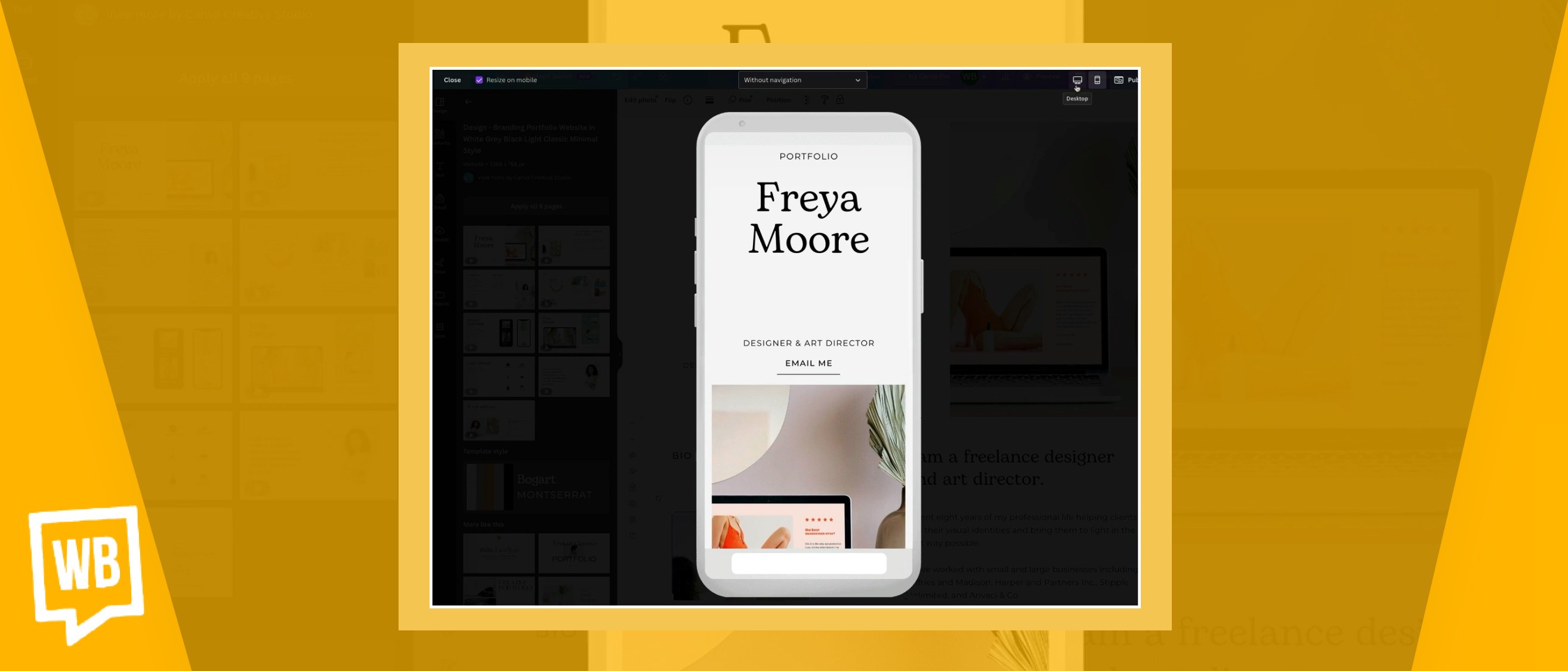
Step 7: Publish Your Website
Once satisfied with your design, it's time to publish your Canva website.
- Click "Publish" in the top-right corner of the Canva editor.
- Choose a suitable domain option (e.g., Free domain) on the right side.
- Click "Continue" to edit your site URL, browser tab preview title, and description.
- Finally, hit "Publish" to make your Canva website live.
This is the final step in learning how to create a website with Canva that looks polished and professional.

Pro Tips for Enhancing Your Website:
Follow these pro tips to enhance your Canva website creation process and create a visually appealing, functional website that aligns with your brand.
- Utilize Canva's Brand Hub: While Canva offers a robust set of features in its free version, upgrading to Canva Pro unlocks additional benefits. The Brand Hub feature, in particular, allows you to define and maintain your brand's colors, fonts, and styles. This ensures consistency across all your designs, including your website. Consider the value of Canva Pro to your website creation process and overall branding efforts.
- Adding Functionality: Canva allows easy integration of external tools like Calendly to schedule appointments.
- Animating Elements: Enhance your landing page with animations. Canva allows you to animate text and other elements with a few clicks, adding a dynamic touch to your design.
- Canva AI Writing: Leverage the magic of Canva AI for seamless website copywriting. Choose a headline, click "Continue Writing," and watch as Canva extends it into a polished paragraph. Customize fonts and sizes to match your design, emphasizing the importance of a well-crafted website. Set clear calls to action effortlessly, linking them to your preferred platforms.
Canva's AI doesn't stop at the text; it also optimizes images. The background remover ensures a professional, cohesive look. Transform your workflow and elevate your online presence with Canva's user-friendly AI features.
- Tracking Conversions: Use Canva’s insights feature to track user engagement and conversions. Monitor how visitors interact with your page, analyze traffic sources, and gauge the effectiveness of your call-to-action buttons.
- Creating a Multilingual Website: Enhance user experience for a global audience by duplicating and translating pages on Canva. Maintain consistent design across language versions and consider cultural nuances during translation.
- Customizing Favicon and Title: Elevate professionalism by customizing your website's icon and page title in Canva. Choose an influential icon that aligns with your brand, and optimize the title and description for SEO.
- Editing After Publishing: Enjoy the flexibility of editing your site post-publishing. Whether making minor tweaks or substantial updates, seamlessly access the editing option to refine your site over time.
- Optimizing for SEO: Boost your website's visibility on search engines with Canva's SEO features. Add meta tags and descriptions to increase the chances of discovery by relevant audiences. Implement basic SEO practices for improved search ranking.
- Troubleshooting and Design Tips: While Canva is user-friendly, be prepared for challenges. Learn common issue resolutions, explore Canva's community, and support resources for help. Follow design best practices for a cohesive and visually appealing website.
FAQs:
1. Why choose Canva for website building?
Canva stands out for its design-centric approach to website creation, offering complete control over visual aspects. It allows users to turn intricate designs into fully operational websites, seamlessly integrating various elements like videos, icons, images, and text.
2. Can I preview and publish my website directly on Canva?
Once your design is complete, click "Preview" to see how your page looks on desktop and mobile devices. Canva's "Publish Website" feature allows you to publish your site on a free domain hosted by Canva. Alternatively, you can purchase a domain for a more professional touch.
3. How can Canva Pro enhance my website creation process?
Canva Pro offers additional benefits, including the Brand Hub feature, which allows you to define and maintain your brand's colors, fonts, and styles for consistency across all designs, including your website. Consider the value of Canva Pro to your website creation process and overall branding efforts.
4. Can Canva handle functionality on a website?
Yes, Canva isn't just for static design; it can handle functionality, too. You can easily embed videos by dragging and dropping, adjusting the size, and integrating external tools like Calendly for scheduling appointments.
5. Can I track user engagement and conversions on my Canva-built website?
Yes, Canva provides an insights feature to track user engagement and conversions. Monitor how visitors interact with your page, analyze traffic sources, and gauge the effectiveness of your call-to-action buttons.
Conclusion:
Creating a website with Canva offers a streamlined and efficient process for individuals and small businesses looking to create a website. With its user-friendly interface, design elements, and integration capabilities, Canva provides a cost-effective solution for creating visually appealing and functional landing pages.
Whether you're a beginner or an experienced designer, Canva's features empower you to showcase your brand effectively online. If you're wondering how to create a website on Canva, follow the steps outlined in the guide above for a seamless and enjoyable design experience. Happy designing!
Related Article:
B2B Website Best Practices For Lead Generation
Pass UTM Parameters to Next Page for Accurate Tracking
How to Bulk Add UTM Parameters to Google AdsHow to Set Up YouTube Video Tracking Using UTM Parameters?
CRO Best Practices for B2B Website

%20(1).webp)
